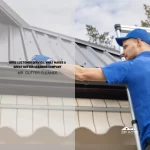Gutter guards serve as a critical component in home maintenance, offering protection against debris accumulation in gutters, which can lead to water damage and pest infestations.
By preventing clogs and facilitating water flow away from a home’s foundation, these guards enhance the longevity and efficacy of gutter systems.
Homeowners face various options, each with its unique advantages and disadvantages.
From screen to foam, brush, micro mesh, surface tension, and reverse curve types, the selection encompasses a range of materials and designs tailored to meet different environmental conditions and maintenance preferences.
This introduction lays the groundwork for understanding how gutter guards contribute to home value, safety, and comfort, highlighting the importance of choosing the right type for individual needs.
It also sets the stage for a deeper exploration of each gutter guard type, installation considerations, maintenance requirements, and their overall impact on home upkeep.
This detailed guide aims to equip homeowners with the knowledge to navigate the vast market of gutter guards, ensuring an informed decision that optimizes home protection and maintenance efficiency.
What Are Gutter Guards?
Gutter guards are essential tools in home maintenance, designed to prevent gutters from becoming clogged with leaves, twigs, and other debris. These devices facilitate water flow away from the home’s foundation, significantly reducing the risk of water damage and the need for frequent gutter cleaning. The introduction of gutter guards into a home’s maintenance routine can lead to substantial time and cost savings for homeowners, ensuring the long-term protection of their property.
Why Use Gutter Guards for Home Maintenance?
Gutter guards are instrumental in enhancing home maintenance by mitigating the risks associated with clogged gutters, such as foundation damage, basement flooding, and landscape erosion. By maintaining clear gutters, they play a critical role in preserving the structural integrity of a home and preventing water-related damage. Gutter guards are a proactive measure that contributes to the overall well-being of a property, offering peace of mind to homeowners through reduced maintenance needs and improved home safety.
How Do Gutter Guards Improve Home Value?
Incorporating gutter guards into a home’s gutter system not only protects the property from water-related issues but also enhances its overall value. By reducing the need for frequent cleanings and mitigating potential water damage, gutter guards make a property more appealing to potential buyers. They represent a value-added feature that indicates a well-maintained home, potentially leading to higher resale values and a more attractive real estate listing. Gutter guards are an investment in the home’s longevity and appeal, offering tangible benefits to current homeowners and future buyers alike.
The Different Types of Gutter Guards
Gutter guards are integral to maintaining a home’s exterior by preventing clogs in gutter systems. They are available in various types, each designed to keep debris out while allowing water to flow freely. Selecting the right type of gutter guard can significantly impact the effectiveness of a home’s gutter system and its overall maintenance requirements.
Screen Gutter Guards: Overview and Benefits
Screen gutter guards feature a simple yet effective design, employing a mesh screen to filter out leaves, twigs, and other debris. This type of guard allows water to pass through while preventing gutter blockages, reducing the need for frequent cleaning.
How Do Screen Gutter Guards Work?
Screen gutter guards sit atop gutters, with a mesh that varies in size to block different types of debris. Water flows through the mesh into the gutter, while larger debris is stopped on the surface, eventually blowing away or being removed manually.
What Are the Disadvantages of Screen Gutter Guards?
While effective, screen gutter guards can require maintenance to remove debris that accumulates on top. Smaller particles can also pass through the mesh, necessitating occasional gutter cleaning.
Foam Gutter Guards: Overview and Benefits
Foam gutter guards are inserted directly into the gutter, filling the space and preventing debris from entering. They are made from a porous material that allows water to seep through while blocking debris.
How Do Foam Gutter Guards Work?
These guards work by fitting snugly inside gutters, letting water pass through the porous foam while debris sits on top, preventing it from entering the gutter channel.
What Are the Disadvantages of Foam Gutter Guards?
Over time, foam guards can become clogged with small particles, reducing their effectiveness. They may also require replacement to maintain optimal performance.
Brush Gutter Guards: Overview and Benefits
Brush gutter guards consist of bristles that extend upwards, trapping debris while allowing water to flow through the gutter system.
How Do Brush Gutter Guards Work?
These guards are placed directly inside gutters, with stiff bristles that catch debris while letting water filter through.
What Are the Disadvantages of Brush Gutter Guards?
Debris can get caught in the bristles and may be difficult to remove, requiring occasional cleaning to ensure they remain effective.
Micro Mesh Gutter Guards: Overview and Benefits
Micro mesh gutter guards offer superior filtration with a fine mesh that blocks even the smallest debris while allowing water to flow through.
How Do Micro Mesh Gutter Guards Work?
This type utilizes a fine mesh screen that sits over the gutter, catching fine debris while water flows through the tiny openings.
What Are the Disadvantages of Micro Mesh Gutter Guards?
The fine mesh can sometimes become clogged with tiny particles, and in areas with heavy rainfall, water may overshoot the gutter.
Surface Tension Gutter Guards: Overview and Benefits
Surface tension gutter guards, also known as helmet guards, feature a curved design that leverages the principle of surface tension to guide water into the gutter while shedding debris over the edge.
How Do Surface Tension Gutter Guards Work?
These guards are mounted to the gutter’s edge, creating a curve over which water flows into the gutter while debris falls to the ground.
What Are the Disadvantages of Surface Tension Gutter Guards?
They can be visible from the ground and may require precise installation to function correctly. In heavy rain, water may overshoot the gutter.
Reverse Curve Gutter Guards: Overview and Benefits
Reverse curve gutter guards are designed to direct rainwater downward while allowing debris to fall to the ground, similar to surface tension guards but with a distinct design that separates water from debris more effectively.
How Do Reverse Curve Gutter Guards Work?
These guards have a curved surface that guides water into the gutter while causing leaves and debris to fall off the edge, utilizing gravity and the physical properties of water to enhance gutter efficiency.
What Are the Disadvantages of Reverse Curve Gutter Guards?
Reverse curve gutter guards require professional installation, increasing costs. They may also alter a home’s appearance and can struggle with heavy rainfall, potentially causing water to overshoot the gutter. Small debris might still enter, requiring some maintenance.
Choosing the Right Gutter Guard for Your Home
Selecting the appropriate gutter guard is crucial for maximizing the efficiency and longevity of your home’s gutter system. Several factors influence this decision, ensuring your chosen solution aligns with your home’s specific needs and environmental conditions.
Factors to Consider When Selecting a Gutter Guard
When choosing a gutter guard, consider debris type and volume, gutter size and type, climate, and aesthetic preferences. The right guard should efficiently block the debris common to your area while ensuring optimal water flow. Additionally, compatibility with your gutter system and the guard’s appearance relative to your home’s exterior are important.
Comparing Gutter Guard Costs and Lifespan
Gutter guards vary in price and durability. Screen and foam types are generally less expensive but may require more frequent replacements. Micro mesh and surface tension guards, while costlier, offer longer lifespans and better performance, making them a cost-effective choice over time.
Installation: DIY vs. Professional Services
Consider whether you’ll install the gutter guard yourself or hire professionals. While DIY installation can save money, professional services ensure correct installation and often come with warranties, providing value through peace of mind and long-term protection.
Maintaining Your Gutter Guards
Regular maintenance ensures the effectiveness and longevity of your gutter guards. Proper care can prevent common issues and extend the life of your gutter system.
Cleaning and Maintenance Tips for Gutter Guards
To maintain gutter guards, conduct regular inspections, especially after severe weather, to remove any debris accumulation on top. For certain types like foam and brush guards, occasional removal for deep cleaning may be necessary to prevent clogs within the guard itself. Ensuring downspouts are clear is also critical for optimal performance.
How Often Should Gutter Guards Be Replaced?
The lifespan of gutter guards varies by type and material. Screen and foam guards may need replacement every few years, whereas micro mesh and surface tension guards can last much longer, potentially up to 10-20 years with proper maintenance. Regular inspections will help identify when replacements are needed.
The Impact of Gutter Guards on Home Safety and Comfort
Gutter guards contribute significantly to a home’s safety and comfort by preventing issues related to water damage and infestations.
Preventing Water Damage and Pests with Gutter Guards
By keeping gutters clear, gutter guards help prevent water overflow that can lead to foundation damage, landscape erosion, and basement flooding. They also deter pests like rodents and insects by eliminating debris that can serve as nesting material.
Enhancing Home Comfort and Aesthetics with Gutter Guards
Gutter guards can improve a home’s overall comfort by reducing the need for frequent maintenance and the worries associated with water damage. Aesthetically, they can be designed to blend with your home’s exterior, enhancing its appearance while providing functional benefits.
Conclusion: Are Gutter Guards Worth the Investment?
Evaluating the pros and cons of gutter guards is essential to determine their value for your home.
Summarizing the Advantages and Disadvantages
Gutter guards offer substantial benefits, such as reducing the need for frequent cleanings, preventing water damage, and deterring pests. However, disadvantages include the initial installation cost and, for some types, the need for occasional maintenance to manage small debris.
Making an Informed Decision on Gutter Guards
The decision to invest in gutter guards depends on your specific situation, including the environment around your home, your ability to maintain the gutter system, and your budget. Weighing the long-term savings in maintenance and repair costs against the initial investment can help you make an informed choice. Ultimately, for many homeowners, the benefits of gutter guards outweigh the costs, making them a worthwhile addition to home maintenance strategies.


